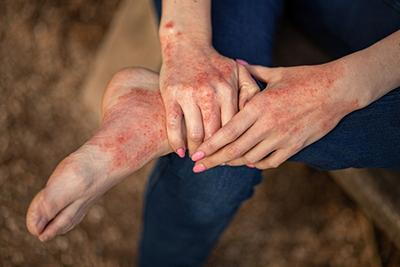Treating Eczema
posted: Apr. 02, 2024.

Eczema refers to a common skin condition that causes dry, itchy skin patches. According to Dr. David Kessler, Dr. Todd Coven, and Dr. Martin Kessler of Massapequa Dermatology in Massapequa, NY, eczema is not contagious and typically comes and goes – often flaring up when you come into contact with an allergen or irritant. Fortunately, strategies and medical interventions help prevent or manage the frequency of eczema flare-ups and minimize related symptoms, but there is no cure – yet.
Treating Eczema
While there is no known exact cause of eczema, this skin condition – unique to each individual - is thought to be caused by a combination of environmental and genetic. So, in addition to proactively choosing to manage the stress in your life (i.e., yoga, meditation, mindfulness, etc.), it is essential to have a consistent skincare routine that includes keeping you and your skin hydrated.
Those challenged by eczema will often find relief by -
- Identifying & Avoiding Triggers.
Eczema is an individualized condition, so knowing the triggers to avoid is important. These may include -- Specific foods.
- Fabrics.
- Stress and anxiety.
- Weather conditions - Very cold and hot weather often trigger flare-ups, so it helps to wear clothing that protects your skin. When dry conditions permeate, use a humidifier.
- Moisturizing Regularly & Using Appropriate Skincare Products.
- To lock in moisture, liberally apply a fragrance-free, hypoallergenic moisturizer right after you shower. This is exceptionally important when the weather conditions are extreme.
- Choose gentle and non-irritating soaps and cleansers, and avoid those with harsh chemicals.
- Avoiding Hot Showers/Baths.
If you have eczema, it is smart to bathe in lukewarm water because bathing in hot water can diminish natural skin oils and aggravate eczema symptoms. - Keeping Your Nails Short & Clean.
Scratching, even incidental scratching, aggravates symptoms. So, short nails are beneficial, as are wearing cotton gloves to avoid scratching while sleeping. - When Drying Yourself After a Bath/Shower – Do Not Rub, But Pat Yourself Dry.
Rubbing your skin after a shower/bath can intensify eczema symptoms. - Wearing Breathable & Soft Fabrics.
Select clothing made from natural materials and softer materials, as these will cause less skin irritation. - Taking Medications.
Apply OTC, prescription, or topical steroids as your dermatologist recommends. Other oral medications can also help reduce swelling and itchiness. Immunosuppressant drugs are available to regulate how your immune system responds.
Consult with a Leading Massapequa, NY Dermatologist Near You
Eczema management is highly individualized and most often requires a customized treatment plan. For more information on how the dermatologists at Massapequa Dermatology can help, contact Dr. Kessler, Dr. Coven, or a staff member at 516-799-1600 or online.